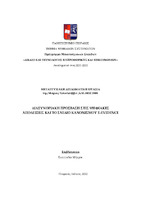Διασυνοριακή πρόσβαση στις ψηφιακές αποδείξεις και το σχέδιο κανονισμού e-Evidence

Προβολή/
Λέξεις κλειδιά
Διασυνοριακή πρόσβαση ; e-Evidence ; Δίκτυο 24/7 ; Οδηγία 2014/41/ΕΕ ; Σύμβαση της ΒουδαπέστηςΠερίληψη
Σήμερα, εγκληματικές πράξεις δύναται να τελούνται ταχύτατα μέσω του
Διαδικτύου από τα πιο απομακρυσμένα σημεία του πλανήτη και να
αναπτύσσουν τα εγκληματικά αποτελέσματά τους σε πολλά κράτη
ταυτόχρονα. Την ίδια στιγμή, τα ηλεκτρονικά αποδεικτικά στοιχεία που θα
μπορούσαν να οδηγήσουν στην ανακάλυψη του δράστη ή να αποδείξουν την
ενοχή του μπορούν να αποθηκεύονται σε οποιοδήποτε μέρος του πλανήτη.
Έτσι, η συνεργασία των Αρχών επιβολής του Νόμου όλων των κρατών του
κόσμου αναδεικνύεται περισσότερο αναγκαία από ποτέ για την
αντιμετώπιση του Κυβερνοεγκλήματος. Επί του παρόντος, για την πρόσβαση
σε ηλεκτρονικά αποδεικτικά μέσα σε παγκόσμιο επίπεδο τυγχάνουν
εφαρμογής οι διατάξεις διεθνούς συνεργασίας της Σύμβασης για το
Έγκλημα στον Κυβερνοχώρο. Σε επίπεδο Ευρωπαϊκής Ένωσης (ΕΕ), το
βασικότερο «εργαλείο» των Αρχών αποτελεί η Ευρωπαϊκή Εντολή Έρευνας.
Ωστόσο, η πλειοψηφία των διαδικτυακών εταιριών – «κολοσσών» εδρεύουν
στις Ηνωμένες Πολιτείες της Αμερικής (ΗΠΑ). Μεταξύ ΕΕ και ΗΠΑ έχει
υπογραφεί Συμφωνία Αμοιβαίας Δικαστικής Συνδρομής ήδη από το έτος 2003
και εφαρμόζεται από το 2010. Τέλος, ο μεγάλος όγκος των αιτημάτων
συνδρομής των Ευρωπαϊκών Αρχών προς τις ΗΠΑ και η ανάγκη για
ταχύτερη πρόσβαση στα ηλεκτρονικά αποδεικτικά μέσα, λόγω κυρίως του
ευμετάβλητου χαρακτήρα τους, δημιούργησαν ένα νέο μοντέλο συνεργασίας:
η νομοθεσία των ΗΠΑ επιτρέπει στους Παρόχους Υπηρεσιών να
συνεργάζονται απευθείας με τις Αρχές επιβολής του Νόμου άλλων Κρατών,
όπως για παράδειγμα των Κρατών της ΕΕ, θέτοντας όμως κάποιους
σημαντικούς περιορισμούς. Η ανάγκη για τη θέσπιση αποτελεσματικών
θεσμών διασυνοριακής συνεργασίας ειδικότερα στον τομέα των
ηλεκτρονικών αποδεικτικών μέσων σε ποινικές υποθέσεις οδήγησε
πρόσφατα σε έντονες συζητήσεις και διαπραγματεύσεις, τόσο σε Ευρωπαϊκό
όσο και σε παγκόσμιο επίπεδο.
4
Στις 17 Απριλίου 2018 η Επιτροπή ενέκρινε δύο νομοθετικές προτάσεις: την
Πρόταση Κανονισμού σχετικά με την Ευρωπαϊκή Εντολή Υποβολής και την
Ευρωπαϊκή Εντολή Διατήρησης ηλεκτρονικών αποδεικτικών στοιχείων σε
ποινικές υποθέσεις και την Πρόταση Οδηγίας σχετικά με τη θέσπιση
εναρμονισμένων κανόνων για τον ορισμό νόμιμων εκπροσώπων με σκοπό τη
συγκέντρωση αποδεικτικών στοιχείων στο πλαίσιο ποινικών διαδικασιών, η
οποία συμπληρώνει τον παραπάνω Κανονισμό. Εξελίξεις στον τομέα των
ηλεκτρονικών αποδεικτικών μέσων σε ποινικές υποθέσεις προηγήθηκαν στις
ΗΠΑ., όπου στις 23 Μαρτίου 2018 εκδόθηκε από το Κογκρέσο των Ηνωμένων
Πολιτειών της Αμερικής ο Νόμος Clarifying Lawful Use of Overseas Data
(CLOUD) Act, για την αποσαφήνιση της νόμιμης χρήσης δεδομένων στο
εξωτερικό. Μεταξύ των άλλων ο Νόμος αυτός εξουσιοδοτεί την εκτελεστική
εξουσία των ΗΠΑ να συνάπτει συμφωνίες με ξένες κυβερνήσεις, σύμφωνα
με τις οποίες οι ξένες κυβερνήσεις μπορούν να αποκτήσουν ταχεία πρόσβαση
στα δεδομένα, που διατηρούνται εντός της επικράτειας των ΗΠΑ.
Έτσι, άνοιξε ο δρόμος για την έναρξη των διαπραγματεύσεων μεταξύ ΗΠΑ
και ΕΕ για την υπογραφή Σύμβασης Αμοιβαίας Δικαστικής Συνδρομής στον
τομέα των ηλεκτρονικών αποδεικτικών μέσων σε ποινικές υποθέσεις,
διαπραγματεύσεις, οι οποίες ξεκίνησαν επίσημα την 6η Ιουνίου 2019. Τέλος,
σε παγκόσμιο επίπεδο, την ίδια ημέρα το Ευρωπαϊκό Συμβούλιο
εξουσιοδότησε την Ευρωπαϊκή Επιτροπή να διαπραγματευθεί εκ μέρους της
ΕΕ το Δεύτερο Πρόσθετο Πρωτόκολλο της Σύμβασης του Συμβουλίου της
Ευρώπης για το έγκλημα στον Κυβερνοχώρο.


